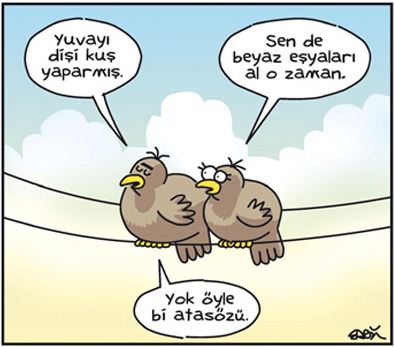
Let’s be frank: my Turkish isn’t much good. I’ve been learning regularly for over three years; I wish I spoke it better.
Thanks to my excellent teachers, however, I’ve made some progress: you can compare, for example, my first video blog in Turkish in August 2013; my video about Lundy Island, in November 2013; and my video on conspiracy theories in July 2015.
What? You don’t see any progress? Well, so be it.
In learning Turkish, I have often been struck by the immense wealth of the language. Turkish has elements of Arabic, French and Farsi. It is rich in humour and culture. Best of all, there are countless sayings which demonstrate the rich heritage of the language and culture of Turkey.
Here are a few examples. I’ve put a few English equivalents, but would welcome suggestions for the others.
– “Yenilen pehlivan güreşe doymaz” (A defeated wrestler always wants another match). Meaning: He who fails will always want to try again and again until he’s successful.
– “Deli deliyi görünce değneğini saklarmış” (When two madmen see eye to eye, each hides his stick from the other). Meaning: when you come across someone as aggressive as yourself, you’ll have to calm down.
– “Meyve veren ağaç taşlanır” (the tree which bears fruit is stoned). Meaning: someone who comes up with ideas is criticised. English equivalent: tall poppy syndrome.
– “Dereyi görmeden paçaları sıvama” (don’t roll up your trousers before you reach the stream). Meaning: don’t anticipate success too soon. English equivalent: don’t count your chickens (before they’re hatched).
– “Su akarken testisini doldurmak” (to fill one’s bucket when the water is flowing). Meaning: save money when you can. English equivalent: make hay while the sun shines.
– “Bal tutan parmağını yalar” (he who handles honey, licks his fingers). Meaning: someone in charge of money gets to enjoy some personal benefits.
– “Havlayan köpek ısırmaz” (the dog that barks does not bite). Meaning: a person may talk well without achieving anything. English equivalent: all bark and no bite; an empty vessel makes the most noise; or, my favourite, all mouth and no trousers.
– “Ayağını yorganına göre uzat” (lay your feet in the length of your kilt). Meaning: spend according to the amount of money you have. English equivalent: cut your suit according to your cloth.
– “Her koyun kendi bacağından asılır” (every sheep is hanged from its own leg). Meaning: everyone is responsible for their own actions (another version is “Hamama giren terler” – enter a Turkish bath and you will sweat). English equivalent: as you make your bed, so you must lie on it.
– “Horozu çok olan köyün sabahı geç olur” (in a village with too many roosters, morning will come late). Meaning: with too much deliberation, a solution won’t be reached. English equivalent: too many cooks spoil the broth.
– “Iti ite kirdirmak” (killing a dog with another dog). Meaning: fight evil with evil. English equivalent: set a thief to catch a thief.
– “Ağaç yaşken eğilir” (the tree branch should be bent when it is young). Meaning: train, or condition, a person at an early age. English equivalent: give me the child, and I’ll give you the man; or you can’t teach an old dog new tricks.
– “Damlaya damlaya göl olur” (drop by drop, a lake with form). Meaning: small savings will lead to wealth. English equivalent: look after the pennies and the pounds will look after themselves.
– “Sütten ağzı yanan, yoğurdu üfleyerek yer” (he who burns his mouth from drinking hot milk eats yoghurt carefully). Meaning: experience makes you cautious. English equivalent: once bitten, twice shy; or a burnt child dreads fire.
– “Yalancının mumu yatsıya kadar yanar” (a liar’s candle will last until evening). Meaning: lies will be found out eventually. English equivalent: truth will out (I’ve heard the alternative in several languages: “lies have short legs”).
One could write an essay about what these proverbs (and those English equivalents I can think of, or the lack of them) tell you about life in the two countries. There’s a second essay about whether proverbs demonstrate universal values. There’s a third essay about the excellent dry wit of Turkish cartoonists – see above. But I’ve written enough already. If you have better translations of some of these proverbs, please put them in the “Comments” section.
Suffice to say: 77 million Turkish-speakers have created, and continue to create, a rich mix of a language which we should relish, plunge into and try to speak better. That sounds like 77 million reasons to like Turkish to me.
Follow Leigh Turner on Twitter @LeighTurnerFCO
